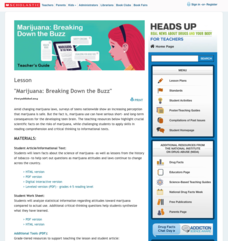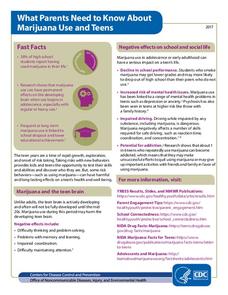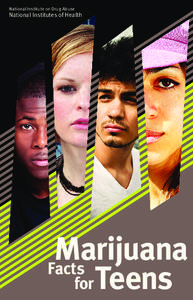Scholastic
Marijuana: Breaking Down the Buzz
Teenagers get the real information about marijuana use based on the history of tobacco legislation and research. As they read an educational passage about marijuana laws, science, and changing attitudes, they address their preconceptions...
Centers for Disease Control and Prevention
What Parents Need to Know About Marijuana Use and Teens
The teenage years find adolescents yearning for independence—and often isolating their parents from their everyday lives. Educate parents on the warning signs of marijuana use, including its effects on the brain and the likelihood of...
Centers for Disease Control and Prevention
Risks from Smoking
Discover what smoking does to one's body with a detailed reference page that points out the types of cancers and chronic diseases that can occur when using tobacco products.
Scholastic
Marijuana Facts
Can marijuana really hurt you? Three medical facts and three discussion questions prompt teenagers to consider the ramifications of using marijuana recreationally.
National Institute on Drug Abuse
Marijuana Facts for Teens
Is marijuana addictive? Can you drive under the influence of marijuana? What happens if you smoke marijuana while you're pregnant? Teenagers learn the answers to these and many more frequently asked questions in an online booklet about...
Generation Rx
My Generation Rx: Plot Twists
How can prescription drugs be dangerous if they were prescribed by a doctor? Is it okay to share your prescription drugs with friends if they really need them? Clear up any common misconceptions about prescription drugs with a set of...
National Institute on Drug Abuse
The Brain's Response to Drugs
Marijuana affects the brain differently than inhalants, which have a different effect than opioids. Elementary and middle school classes read about these drugs as well as nicotine, methamphetamine, hallucinogens, and steroids before...
Nemours KidsHealth
Drugs: Grades 6-8
What happens to your body when you use drugs? What do you do if your friend wants you to start using? Learn about the signs of addiction and the ways to withstand peer pressure with two classroom activities. After storyboarding the...
Discovery Education
Is Our Community Influenced by the Opioid Epidemic?
Opioid abuse is becoming a national crisis, but combating the influence of opioids requires examining the ways it affects individual communities. A thorough teacher guide provides step-by-step instructions about implementing an...
PBS
Stories of Painkiller Addiction: Commitment to Recovery
Recovery from substance addiction is an ongoing process. The final lesson in a series about painkiller abuse and addiction prompts learners to research various recovery options before writing a short story about a character who is going...
PBS
Stories of Painkiller Addiction: Decisions and Consequences
Teach young learners that most drug addictions end in one of three outcomes: treatment, jail, or death. After watching a short video segment on the consequences of drug abuse, class members discuss what they viewed and consider what...
PBS
Stories of Painkiller Addiction: The Brain on Autopilot
For some people, the force of addiction can be as biologically compelling as the drive for food or water. High schoolers watch a video segment about Ryan, a recovering addict, and learn more about how opioids and other drugs can affect...
PBS
Stories of Painkiller Addiction: Prescription Drug Abuse Awareness Campaign
The I-STOP law was designed to regulate the distribution and tracking of prescription drugs. After reading an article about its signing and implementation, middle and high schoolers work together to come up with their own ideas for an...
PBS
Stories of Painkiller Addiction: Contemplating Nature vs. Nurture
Does having an addict in your family make it more likely to become one yourself? Explore the genetic risk factors, as well as the prominent environmental influences, for substance addiction in a lesson plan that encourages awareness and...
National Association of School Nurses
Learn to Be Smart and Safe with Medicine
The stated purpose of a school tool kit is to help schools implement teen prescription drug abuse awareness programs. The kit includes actions that groups can take in the school, with parents, and in the community at large.
Nemours KidsHealth
Drugs: Grades 9-12
What do drugs do to the body and to the mind? What are the dangers of using drugs? How can teens respond to the pressure to use drugs? After reading a series of articles related to drug use and abuse, class members prepare a skit to...
US National Library of Medicine
Drug Use and Abuse: Past and Present
Pick your poison: tobacco, alcohol, opiates, cocaine, or marijuana. An online exhibition launches a research project that asks groups to select one of the five drugs and gather information on how the use of the drug and the regulations...
Discovery Education
The Science of Addiction: The Story of Teens
Users of Discovery Education's interactive on the biology of addiction examine common misconceptions about opioids and learn about the factors that cause addiction. Additionally, they listen to the stories of three teens and their...
The New York Times
Investigating the Heroin and Prescription Opioid Epidemic
How bad is the opioid crisis in America? Has it gotten worse in the last few decades? Why? High schoolers delve into these questions with a thorough and thoughtful lesson from The New York Times on heroin prescription opioids. Starting...
Scholastic
Opioids and the Overdose Epidemic
Learn about the opioid and overdose epidemic in America with an article that explains what opioids are, how they are used, and how they are abused. Learners discover the death rates associated with opioid overdoses and other factors that...
University of Minnesota
What's the Deal? Addiction Card Game
Addiction is a big deal! Playing a game of cards helps learners understand the concept of addiction. Through their analysis, they examine the potential for addiction and how it varies for each individual.
Council for the Curriculum, Examinations and Assessment
Drugs Awareness
Legal and illegal. Use and misuse. Risks and consequences. Myths and facts. Class members investigate the effects on the body of various drugs, including cannabis, nicotine, and alcohol.
Council for the Curriculum, Examinations and Assessment
Drugs Awareness
The final lesson in a series of 10 focusing on Social, Physical, Emotional, Cognitive and Spiritual (SPECS) health investigates the effects of legal and illegal substances, their risks, and the consequences of their misuse.
Scholastic
Prescription Pain Medications
Young scholars study different pain medications and their side effects. In this drug usage lesson students read articles and complete a worksheet.

























